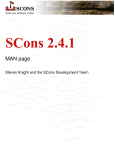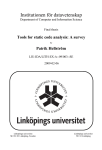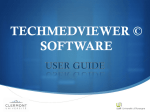Download Introduction to software development tools
Transcript
Introduction to software development tools
.S
make
.h
Introduction to software development tools
.c
.c++
Michael Opdenacker
Free Electrons
http://freeelectrons.com
Created with OpenOffice.org 2.0
Thanks to Nicolas Rougier (Copyright 2003, http://webloria.loria.fr/~rougier/) for the Tux image
Introduction to software development tools
© Copyright 2005, Michael Opdenacker
Creative Commons AttributionShareAlike 2.0 license
Dec 5, 2005
http://freeelectrons.com
1
Rights to copy
Attribution – ShareAlike 2.0
You are free
to copy, distribute, display, and perform the work
to make derivative works
to make commercial use of the work
Under the following conditions
Attribution. You must give the original author credit.
Share Alike. If you alter, transform, or build upon this work, you may distribute the resulting work only under a license identical to this one.
© Copyright 2005
Michael Opdenacker
michael@freeelectrons.com
Document sources, updates and translations: http://freeelectrons.com/articles/swdev
Corrections, suggestions, contributions and translations are welcome!
For any reuse or distribution, you must make clear to others the license terms of this work.
Any of these conditions can be waived if you get permission from the copyright holder.
Your fair use and other rights are in no way affected by the above.
License text: http://creativecommons.org/licenses/bysa/2.0/legalcode
Introduction to software development tools
© Copyright 2005, Michael Opdenacker
Creative Commons AttributionShareAlike 2.0 license
Dec 5, 2005
http://freeelectrons.com
2
Best viewed with...
This document is best viewed with a recent PDF reader
or with OpenOffice.org itself!
Take advantage of internal or external hyperlinks.
So, don’t hesitate to click on them!
Find pages quickly thanks to automatic search
Use thumbnails to navigate in the document in a quick way
If you’re reading a paper or HTML copy, you should get your copy in PDF or OpenOffice.org format on http://freeelectrons.com/articles/swdev!
Introduction to software development tools
© Copyright 2005, Michael Opdenacker
Creative Commons AttributionShareAlike 2.0 license
Dec 5, 2005
http://freeelectrons.com
3
Contents
Source management
Program build automation
Static code checkers
Memory checkers
Introduction to software development tools
© Copyright 2005, Michael Opdenacker
Creative Commons AttributionShareAlike 2.0 license
Dec 5, 2005
http://freeelectrons.com
4
Embedded Linux development tools
Source management
Program build automation
Introduction to software development tools
© Copyright 2005, Michael Opdenacker
Creative Commons AttributionShareAlike 2.0 license
Dec 5, 2005
http://freeelectrons.com
5
GNU toolchain flow (simplified)
Developer
User
configure.in
autoconf
configure
./configure
Check
for required
libraries
automake
Makefile.am
Makefile.in
Generate
Makefile
Makefile
Introduction to software development tools
© Copyright 2005, Michael Opdenacker
Creative Commons AttributionShareAlike 2.0 license
Dec 5, 2005
http://freeelectrons.com
6
GNU toolchain strengths and weaknesses
Universal solution for Unix systems
Still used to build most Free Software C and C++ programs, in particular in GNU
Very powerful and easy for end users:
./configure prefix=/opt
make
make check
make install
Causes of check failures on the user side sometimes not easy to figure out.
No standard configure options
Output very complex Makefiles
Difficult for developers to master
Lots of details to learn and understand
Tedious documentation
Multiple input and output files
Causes of check failures on the user side sometimes not very easy to figure out.
See http://freshmeat.net/articles/view/889/, http://freshmeat.net/articles/view/1702/ and http://freshmeat.net/articles/view/1715/ for discussions about the limitations of autoconf / automake / make and alternatives.
Introduction to software development tools
© Copyright 2005, Michael Opdenacker
Creative Commons AttributionShareAlike 2.0 license
Dec 5, 2005
http://freeelectrons.com
7
SCons (1)
http://www.scons.org/
An alternative to make, written in Python
A successor of the Cons program, written in Perl.
Takes care of all the compiling and dependency handling job.
Dependencies handled with MD5 checksums by default.
Running touch on source files will have no effect!
Also supports autoconf like capabilities: checking for existing libraries, headers or programs on the user system.
Unlike make, autoconf, automake, no specific format!
Access to all Python syntax and scripting facilities.
Introduction to software development tools
© Copyright 2005, Michael Opdenacker
Creative Commons AttributionShareAlike 2.0 license
Dec 5, 2005
http://freeelectrons.com
8
SCons (2)
Native support for lots of compiler based languages:
C, C++, D, Java, Fortran, Yacc, Lex, Qt and SWIG, TeX and LaTeX
Easily extensible through userdefined builders.
Supports building on multiple platforms:
GNU/Linux, Unix, Windows NT, MacOS X, OS/2
Builtin support for fetching source files from SCCS, RCS, CVS, BitKeeper and Perforce.
... and many more features!
Introduction to software development tools
© Copyright 2005, Michael Opdenacker
Creative Commons AttributionShareAlike 2.0 license
Dec 5, 2005
http://freeelectrons.com
9
SCons (3)
Simple SConstruct file:
Library('foo', ['f1.c', 'f2.c', 'f3.c'])
Program('prog.c', LIBS=['foo', 'bar'], LIBPATH='.')
Nice and friendly user manual full of examples:
http://www.scons.org/doc/HTML/sconsuser/book1.html
Introduction to software development tools
© Copyright 2005, Michael Opdenacker
Creative Commons AttributionShareAlike 2.0 license
Dec 5, 2005
http://freeelectrons.com
10
Embedded Linux development tools
Source management
Static code checkers
Introduction to software development tools
© Copyright 2005, Michael Opdenacker
Creative Commons AttributionShareAlike 2.0 license
Dec 5, 2005
http://freeelectrons.com
11
Splint
http://splint.org/, from the University of Virginia
GPL tool for statically checking C programs for security vulnerabilities and coding mistakes
Today's lint program for GNU/Linux.
The successor of LClint.
Very complete manual and documentation
Doesn't support C++
Introduction to software development tools
© Copyright 2005, Michael Opdenacker
Creative Commons AttributionShareAlike 2.0 license
Dec 5, 2005
http://freeelectrons.com
12
Embedded Linux development tools
Debugging and analysis tools
Memory checkers
Introduction to software development tools
© Copyright 2005, Michael Opdenacker
Creative Commons AttributionShareAlike 2.0 license
Dec 5, 2005
http://freeelectrons.com
13
GNU Checker
http://gnu.org/software/checker/
GNU GPL tool to find memory errors at runtime
Detects: reading uninitialized memory, writing in a freed zone, accesses outside of allocated memory, and using NULL pointers.
Garbage collector: can display all memory leaks
Works by replacing glibc's malloc library by its own
Usage:
checkergcc o example example.c
Supports only: Intel GNU/Linux, Sparc Sun Solaris
Latest release in 1998!
Introduction to software development tools
© Copyright 2005, Michael Opdenacker
Creative Commons AttributionShareAlike 2.0 license
Dec 5, 2005
http://freeelectrons.com
14
memcheck
http://hald.dnsalias.net/projects/memcheck/
GNU GPL tool for dynamic memory checking
Works by replacing glibc's memory management functions by its own.
Supports many GNU/Linux and other Unix architectures (unlike GNU Checker): i386, arm, alpha, ia64.
Many others not tested.
Introduction to software development tools
© Copyright 2005, Michael Opdenacker
Creative Commons AttributionShareAlike 2.0 license
Dec 5, 2005
http://freeelectrons.com
15
Valgrind (1)
http://valgrind.org/
GNU GPL Software suite for debugging
and profiling programs.
Supported platforms: x86, x86_64, ppc
Others: compile your program to these platforms to use Valgrind.
Can detect many memory management and threading bugs.
Profiler: provides information helpful to speed up your program and reduce its memory usage.
The most popular tool for this usage.
Even used by projects with hundreds of programmers
Introduction to software development tools
© Copyright 2005, Michael Opdenacker
Creative Commons AttributionShareAlike 2.0 license
Dec 5, 2005
http://freeelectrons.com
16
Valgrind (2)
Can be used to run any program, without the need to recompile it.
Example usage
valgrind leakcheck=yes ls la
Works by adding its own instrumentation to your code and then running in on its own virtual x86 core. Significantly slows down execution, but still fine for testing!
More details on http://valgrind.org/info/ and
http://valgrind.org/docs/manual/coregrind_core.html#howworks
Introduction to software development tools
© Copyright 2005, Michael Opdenacker
Creative Commons AttributionShareAlike 2.0 license
Dec 5, 2005
http://freeelectrons.com
17
Alleyoop
http://alleyoop.sourceforge.net/
Graphical frontend to Valgrind
Introduction to software development tools
© Copyright 2005, Michael Opdenacker
Creative Commons AttributionShareAlike 2.0 license
Dec 5, 2005
http://freeelectrons.com
18
ElectricFence
efence, GNU GPL, from Bruce Perens
http://directory.fsf.org/devel/debug/ElectricFence.html
Stops your program on the exact instruction that overruns or underruns a malloc() memory buffer.
GDB will then display the sourcecode line that causes the bug.
Works by using the virtualmemory hardware to create a redzone at the border of each buffer touch that, and your program stops.
Supposed to work on any platform supported by Linux, whatever the cpu (provided virtual memory support is available) Introduction to software development tools
© Copyright 2005, Michael Opdenacker
Creative Commons AttributionShareAlike 2.0 license
Dec 5, 2005
http://freeelectrons.com
19
Related documents
This document belongs to the more than 1000 page materials of an embedded GNU / Linux training from Free Electrons, available under a free documentation license.
http://freeelectrons.com/training
Introduction to Unix and GNU/Linux
Embedded Linux kernel and driver development
Free Software tools for embedded Linux systems
Audio in embedded Linux systems
Multimedia in embedded Linux systems
http://freeelectrons.com/articles
Linux on TI OMAP processors
Free Software development tools
Introduction to uClinux
Realtime in embedded Linux systems
What's new in Linux 2.6?
Java in embedded Linux systems
How to port Linux on a new PDA
Embedded Linux optimizations
Embedded Linux from Scratch... in 40 min!
Introduction to software development tools
© Copyright 2005, Michael Opdenacker
Creative Commons AttributionShareAlike 2.0 license
Dec 5, 2005
http://freeelectrons.com
20
How to help
If you support this work, you can help ...
By sending corrections, suggestions, contributions and translations
By asking your organization to order training sessions performed by the author of these documents (see http://freeelectrons.com/training)
By speaking about it to your friends, colleagues
and local Free Software community.
By adding links to our online materials on your website,
to increase their visibility in search engine results.
Introduction to software development tools
© Copyright 2005, Michael Opdenacker
Creative Commons AttributionShareAlike 2.0 license
Dec 5, 2005
http://freeelectrons.com
21
Thanks
To the OpenOffice.org project, for their presentation and word processor tools which satisfied all my needs.
To the Handhelds.org community, for giving me so much help and so many opportunities to help.
To the members of the whole Free Software and Open Source community, for sharing the best of themselves: their work, their knowledge, their friendship.
Introduction to software development tools
© Copyright 2005, Michael Opdenacker
Creative Commons AttributionShareAlike 2.0 license
Dec 5, 2005
http://freeelectrons.com
22






































